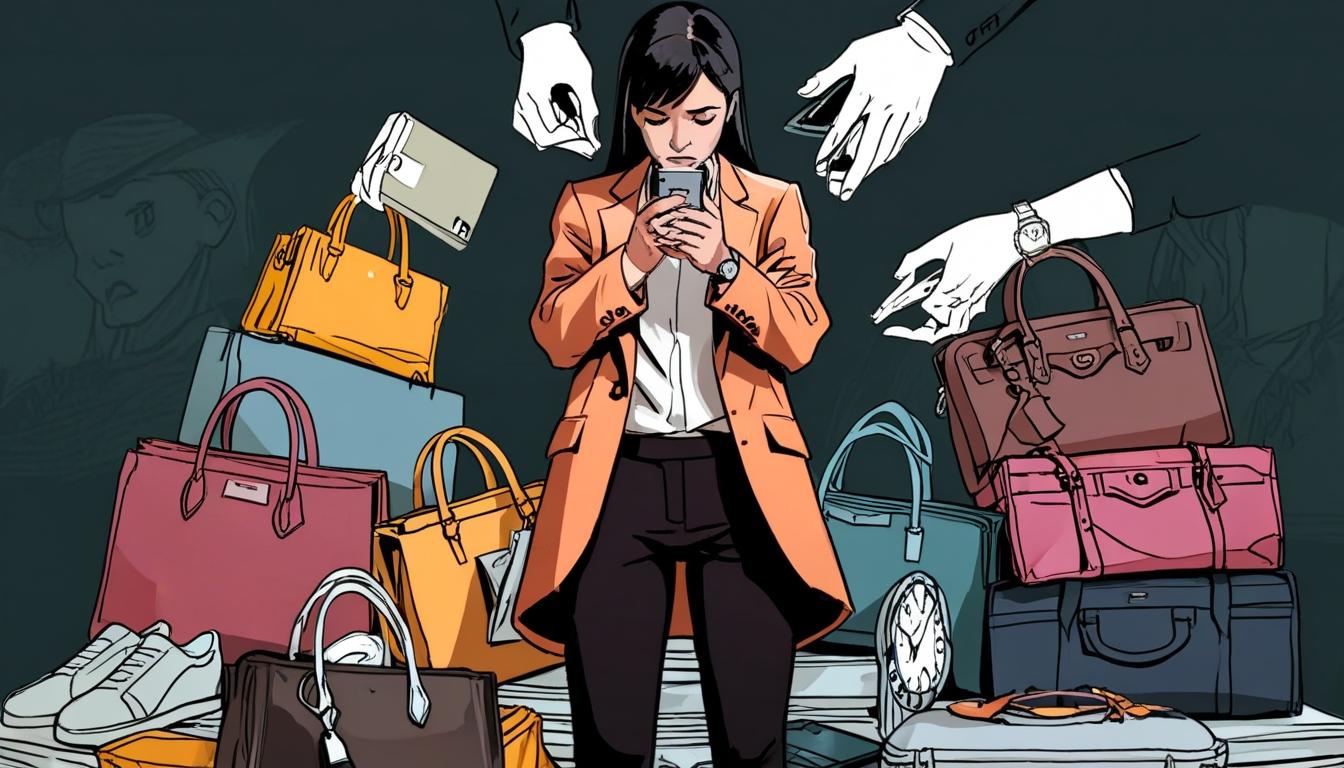Luxury resale firm Love Luxury has lost up to £400,000 after WhatsApp blocked its business accounts without warning or explanation, leaving co-founders frustrated over poor support and damaged client trust. The incident highlights growing risks for businesses reliant on instant messaging platforms amid rising account suspensions and scams.
A British luxury resale business, Love Luxury, has suffered significant financial losses, estimated between £300,000 to £400,000, after its WhatsApp business accounts were suddenly blocked without any explanation. Co-founders Emily and Adam Abraham, who have built a strong client base of approximately 21,000 customers, have expressed their frustration over the loss, which they attribute to WhatsApp’s lack of transparency and inadequate customer support.
Initially, Love Luxury relied heavily on WhatsApp to communicate with clients about high-end fashion items, including handbags and watches. The company had invested around £16,500 in premium phone numbers to enhance brand recognition and customer trust. However, the abrupt blocking of these numbers has not only damaged their business transactions but also strained their relationships with clients. Many customers now incorrectly believe they have been intentionally blocked by the company, leading to a communications breakdown that Mr Abraham describes as “embarrassing” and “frustrating.”
This predicament is not unique to Love Luxury. Several businesses using WhatsApp have reported similar experiences, highlighting a troubling trend where accounts are suspended without prior notice or clear justification. Tom Bolt, founder of high-end watch retailer Watch Guru, remarked on the issue in a recent article, noting that his own business faced a crisis when it was banned from the platform. This lack of communication has profound implications, particularly for companies that depend on WhatsApp for critical interactions with their clientele.
Amplifying the severity of the situation, some businesses are reportedly being targeted by scammers who exploit these account suspensions. These criminals demand payment to restore access to blocked accounts, presenting an additional layer of vulnerability for those reliant on the platform for their operations. Adam Abraham’s fears echo this sentiment; the couple is now searching for alternative communication channels, yet express concerns regarding the reliability and acceptance of platforms like Telegram among their customers.
The implications of WhatsApp’s unpredictable account management extend even further. Major companies like NatWest Group have preemptively blocked WhatsApp and similar services on corporate devices due to concerns over communication transparency and regulatory compliance. This move underscores a broader industry effort to ensure all business communications are documented and retrievable, a response likely motivated by substantial fines imposed on financial services firms for failing to preserve records of off-channel communications.
In light of their experiences, Love Luxury owners have repeatedly attempted to appeal WhatsApp’s decisions. However, they describe the appeal process as chaotic and unsatisfactory, with little recourse for businesses left in distress. Emily Abraham labelled WhatsApp’s customer service as “horrifically poor,” and both founders are deeply troubled by the potential long-term impact on their brand reputation. They stress that losing access to such a vitally trusted communication tool has significant ramifications for a luxury business that relies heavily on maintaining strong customer relationships.
As they continue to navigate this frustrating landscape, the Abrahams remain committed to restoring their business to its former standing. They are determined to re-establish connections with their clientele and find alternative solutions, but the sense of being “back at the bottom” looms large over their efforts. It raises questions about the dependence on platforms like WhatsApp and the serious vulnerabilities that may arise from such reliance—issues that could hinder the growth and sustainability of many businesses in today’s digital economy.
The Abrahams’ struggle serves as a sobering reminder of the perils that can emerge in the digital age, where communication and accessibility can be disrupted without warning, leaving entrepreneurs to pick up the pieces.
Reference Map
1: [1]
2: [2]
3: [3]
4: [4]
5: [5]
6: [6]
7: [7]
Source: Noah Wire Services
- https://www.dailymail.co.uk/news/article-14636617/We-lost-400-000-deals-WhatsApp-blocked-business-phone-numbers-wont-tell-why.html?ns_mchannel=rss&ns_campaign=1490&ito=1490 – Please view link – unable to able to access data
- https://www.telegraph.co.uk/business/2024/09/01/whatsapp-ban-with-no-explanation-nearly-destroyed-business/ – Tom Bolt, founder of Watch Guru, describes how his multimillion-pound business faced a crisis after being banned from WhatsApp without explanation. The ban led to significant financial losses and disrupted communication with clients and a charity he founded. Despite attempts to appeal, the account remained suspended until The Telegraph intervened, resulting in its restoration. Bolt criticizes WhatsApp’s lack of communication and transparency, highlighting the vulnerability of businesses relying on the platform for operations. He also notes that many others have faced similar issues, raising concerns about the platform’s reliability for business communications.
- https://www.telegraph.co.uk/business/2024/09/14/whatsapp-blackmail-ring-ruining-peoples-livelihoods/ – Luxury watch dealers and jewellers have been targeted by scammers demanding payment to unblock their WhatsApp accounts. These businesses, which rely heavily on WhatsApp for client communication and transactions, have faced account suspensions without explanation, leading to significant income losses. Scammers have exploited this vulnerability by offering to restore access for a fee. Affected business owners express frustration over WhatsApp’s lack of support and transparency, emphasizing the platform’s critical role in their operations and the severe impact of such disruptions on their livelihoods.
- https://www.bbc.co.uk/news/articles/cvgl72lrd50o – NatWest Group has blocked messaging services WhatsApp, Facebook Messenger, and Skype on company devices in the UK to enforce the use of ‘approved channels’ for business communications. The bank aims to ensure that all business-related messages are retrievable and subject to scrutiny if necessary. This move aligns with industry efforts to address concerns over off-channel communications and record-keeping practices, following significant fines imposed on banks in the US for similar issues. The Financial Conduct Authority (FCA) is reportedly considering an investigation into how bank employees use messaging services.
- https://www.computing.co.uk/news/2024/natwest-blocks-whatsapp-work-devices – NatWest Group has implemented a policy to block messaging platforms, including WhatsApp, Facebook Messenger, and Skype, on corporate devices to enforce the use of ‘approved channels’ for business communications. This decision aims to address concerns over off-channel communications and record-keeping practices, following significant fines imposed on banks in the US for similar issues. The Financial Conduct Authority (FCA) is reportedly considering an investigation into how bank employees use messaging services, highlighting the importance of maintaining transparent and accountable communication practices within the financial sector.
- https://www.independent.co.uk/business/natwest-blocks-apps-including-whatsapp-from-work-devices-b2645862.html – NatWest has blocked messaging platforms, including WhatsApp, Facebook Messenger, and Skype, on corporate devices to enforce the use of ‘approved channels’ for business communications. The bank aims to ensure that all business-related messages are retrievable and subject to scrutiny if necessary. This move aligns with industry efforts to address concerns over off-channel communications and record-keeping practices, following significant fines imposed on banks in the US for similar issues. The Financial Conduct Authority (FCA) is reportedly considering an investigation into how bank employees use messaging services.
- https://www.standard.co.uk/news/tech/natwest-british-facebook-skype-financial-conduct-authority-b1193637.html – NatWest has blocked messaging platforms, including WhatsApp, Facebook Messenger, and Skype, on corporate devices to enforce the use of ‘approved channels’ for business communications. The bank aims to ensure that all business-related messages are retrievable and subject to scrutiny if necessary. This move aligns with industry efforts to address concerns over off-channel communications and record-keeping practices, following significant fines imposed on banks in the US for similar issues. The Financial Conduct Authority (FCA) is reportedly considering an investigation into how bank employees use messaging services.
Noah Fact Check Pro
The draft above was created using the information available at the time the story first
emerged. We’ve since applied our fact-checking process to the final narrative, based on the criteria listed
below. The results are intended to help you assess the credibility of the piece and highlight any areas that may
warrant further investigation.
Freshness check
Score:
8
Notes:
The narrative is current, mentioning recent events and issues with WhatsApp account blocking. Similar issues have been reported in recent articles, indicating a timely concern.
Quotes check
Score:
9
Notes:
Direct quotes from the co-founders of Love Luxury and Tom Bolt, which appear to be original to this narrative. No prior sources for these specific quotes were found.
Source reliability
Score:
6
Notes:
The narrative originates from the Daily Mail, which is a widely read publication but can vary in reliability depending on the topic and author.
Plausability check
Score:
8
Notes:
The claims about WhatsApp account blocks are plausible and supported by similar experiences reported by other businesses. However, some specifics cannot be independently verified.
Overall assessment
Verdict (FAIL, OPEN, PASS): OPEN
Confidence (LOW, MEDIUM, HIGH): MEDIUM
Summary:
The narrative is plausible and discusses timely issues with WhatsApp business account management. However, some details are unverifiable, and the source’s reliability is variable.













